“First in Human” Documentary Highlights NCI Immunotherapy Research
, by William L. Dahut, M.D.
We’re very excited at NCI about the forthcoming Discovery Channel special, First in Human, which will feature some of the groundbreaking work on cancer immunotherapy being done at the NIH Clinical Center. The three-part series—scheduled to run on August 10, 17, and 24—will feature NCI researchers and staff leading trials of a type of immune-based cellular therapy known as adoptive cell transfer (ACT).
Immunotherapy is one of the most exciting areas of cancer research and the strides that have been made in just the past few years are nothing short of remarkable. The Food and Drug Administration (FDA) has approved six immune checkpoint inhibitors for a growing number of cancers, including Hodgkin lymphoma, lung cancer, and melanoma. And with literally hundreds of ongoing clinical trials and new checkpoint inhibitors being developed, that number is likely to expand.
ACT therapies, however, are beginning to catch up—in particular, treatments known as CAR T-cell therapy. Two CAR T-cell therapy products, in fact, are currently being reviewed by the FDA for the treatment of patients with different types of blood cancers and may well be approved by the end of the year.
First in Human will feature early-stage clinical trials being led by researchers in NCI’s Center for Cancer Research (CCR), Steve Rosenberg, M.D., Ph.D., an ACT pioneer who conducted the first trials of TIL therapy for patients with melanoma, and Terry Fry, M.D., who is leading trials of CAR T cells in children with leukemia. CCR researchers Stephanie Goff, M.D., Jennifer Kanakry, M.D., and Lauren Wood, M.D., are also featured.
NCI has long been at the forefront of the immunotherapy movement, and our researchers continue to push the boundaries of what’s possible with immune-based treatments. For example:
- Dr. Rosenberg and his colleagues in CCR's Surgery Branch and James Kochenderfer, M.D., in the Experimental Transplantation and Immunology Branch are developing and testing several different forms of ACT, having already reported promising findings in patients with advanced cancers, including melanoma, lymphoma, and sarcoma.
- Ira Pastan, M.D., and Robert Kreitman, M.D., in CCR’s Laboratory of Molecular Biology have been instrumental in developing immunotoxins—tumor cell-specific antibodies that are linked to toxins—several of which are being tested in early-stage clinical trials of patients with blood cancers and pancreatic cancer.
- Jeff Schlom, Ph.D., of CCR’s Laboratory of Tumor Immunology and Biology, and James Gulley, M.D., Ph.D., of CCR’s Genitourinary Malignancies Branch, have been at the forefront of treatment vaccines for prostate cancer and other tumor types. One of these vaccines is currently being tested in several different clinical trials, including a phase III trial of men with advanced prostate cancer.
- Tom Waldmann, M.D., of NCI’s Lymphoid Malignancies Branch, co-discovered the cytokine IL-15 and led the first human clinical trial of this promising immunotherapy agent.
In addition to this ongoing research at NCI, under the auspices of the Cancer Moonshot, NCI is establishing an Immunotherapy Clinical Trials Network, which will help to coordinate and prioritize clinical trials of promising immunotherapies. Researchers at NCI and cancer centers across the country will participate in this network, which should further accelerate progress in making immunotherapy a treatment option for many more patients.
For those who are interested in learning more about ACT, NCI has informative resources that discuss and explain these exciting therapies:
CAR T-cell Therapy: Engineering Patients’ Immune Cells to Treat Their Cancers
CAR T Cells Expanding into Multiple Myeloma
Cellular Immunotherapy Targets Common Human Cancer Mutation
I encourage everybody in the cancer community to watch First in Human and see the impact of the remarkable work being done by NCI researchers and the clinical staff who care for patients every day in the NIH Clinical Center.
It’s rewarding to witness many years of hard work developing these therapies starting to come to fruition, and it’s especially gratifying for that work to be recognized and highlighted for the whole country to see.

